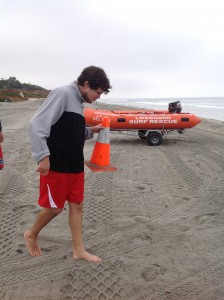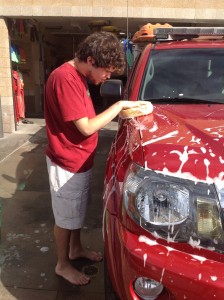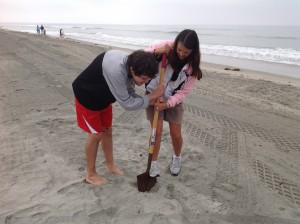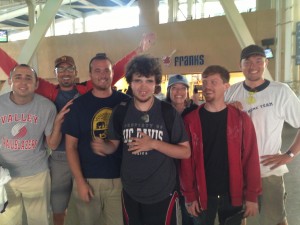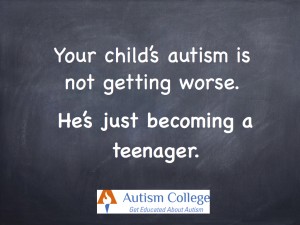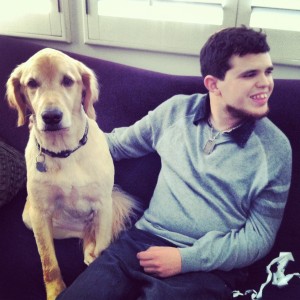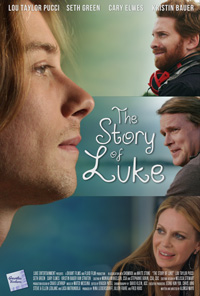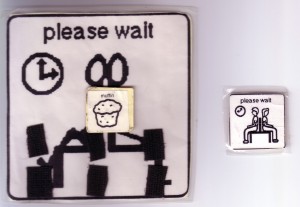Be the change that you wish to see in the world – Mahatma Gandhi
Here at Autism College we enjoy highlighting people that are working towards creating opportunities for those with autism. Here is a guest blog written by Michael Tracy, co-founder of the Julie + Michael Tracy Family Foundation (JMTF) and Urban Autism Solutions. JMTF and Urban Solutions exists to help address challenges in regards to employment and housing that our young adults with autism face.

Julie and Michael Tracy
Julie and I are the parents of two sons, Joseph, 23, and John, 21. While Joe developed typically, John was diagnosed with Pervasive Developmental Disorder (Autism) in preschool. We tried hard to mainstream him, but John struggled socially. No amount of soccer or Boy Scouts or 4H seemed to help. It tore out hearts out to see him so isolated. In middle school, John developed schizoaffective disorder. By the time he reached his sophomore year in high school he had been hospitalized at least three times and we could see that a big change was needed.
In his sophomore year in high school, John was enrolled in the Sonia Shankman Orthogenic School, a residential, therapeutic school associated with the University of Chicago. In the spring of 2011 he had his most serious psychotic break and was hospitalized for five weeks at Rush Hospital on the Near West Side of Chicago. It was a pretty intense experience for John and our family. While Julie and I were very impressed with the care John was given at Rush, we learned of the need for more specific psychiatric and transitional care directed towards young adults with autism and comorbid mental health problems.
After John was released and back at the “O” School, we founded the Julie + Michael Tracy Family Foundation and Urban Autism Solutions to help address challenges facing young adults with autism. Learning that the vast majority of this population lives at home with their parents and often don’t hold jobs and/or have meaningful lives outside the home, we set out to work with Rush University Medical Center to establish the Autism Assessment Research and Treatment Service Center (AARTS) with the goal of working with young adults on the Spectrum to achieve better outcomes.
 Urban Autism Solutions is currently the only organization dedicated to providing wrap around solutions and a path to a fully integrated community life. We plan to create a series of residences for young adults with autism on the near West Side of Chicago. We just purchased our first residence that will house three young adults with autism. The building is in close proximity to Rush, allowing easy access to the Rush AARTS Center. With public transportation, the city is a much more livable place for those like John who will probably never drive. The neighborhood is conducive to walking, as is close not only to Rush but also to the University of Illinois at Chicago, the restaurant district surrounding Taylor Street in Little Italy and the West Loop neighborhood to the north. In the midst of so many businesses and in the shadow of the downtown, we know there may be more opportunities for meaningful employment for John. Finally, an urban setting, due to its diverse populations, might allow for “quirky” young men to “fit in” better.
Urban Autism Solutions is currently the only organization dedicated to providing wrap around solutions and a path to a fully integrated community life. We plan to create a series of residences for young adults with autism on the near West Side of Chicago. We just purchased our first residence that will house three young adults with autism. The building is in close proximity to Rush, allowing easy access to the Rush AARTS Center. With public transportation, the city is a much more livable place for those like John who will probably never drive. The neighborhood is conducive to walking, as is close not only to Rush but also to the University of Illinois at Chicago, the restaurant district surrounding Taylor Street in Little Italy and the West Loop neighborhood to the north. In the midst of so many businesses and in the shadow of the downtown, we know there may be more opportunities for meaningful employment for John. Finally, an urban setting, due to its diverse populations, might allow for “quirky” young men to “fit in” better.
Another initiative of our foundation is to develop social enterprise businesses to provide vocational opportunities for young adults with autism, as well as returning vets and others who need workforce development. This past summer, we launched a pilot community vocational garden, housed in the Illinois Medical District, just west of Rush. Our goal was to learn about urban gardening, health and nutrition and to create a viable path to greater economic independence for this vulnerable population. In addition to harvesting an abundance of produce, all indications of our initial research and assessment of the first year success of this pilot program are very positive. We are busy planning a major expansion for Year Two and we are exploring selling our produce to an institutional partner and at a local farmer’s market.
The long-term goal of the JMTF and Urban Autism Solutions is to provide a safe and supported passage to a fully integrated community life. Through our initiatives of residential housing, groundbreaking research, vocational opportunities and an alliance with the Rush AARTS Center, we know we are creating viable opportunities and solutions for young adults and families with autism. To find out more about our foundation, go to www.jmtf.org.
